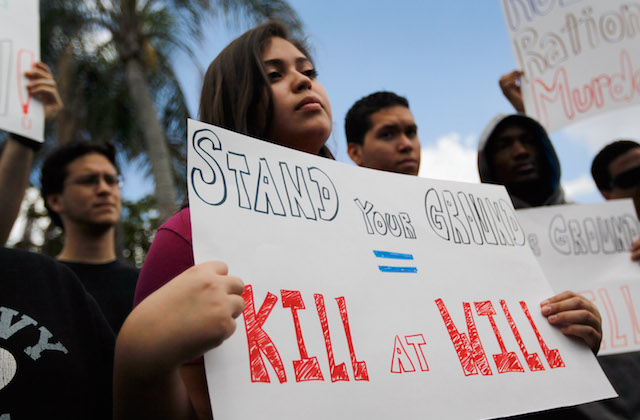Police officers in Florida who use deadly force can now use the state’s so-called "Stand Your Ground" law to protect themselves from prosecution, the Florida Supreme Court ruled yesterday (December 13). The decision will likely make it more difficult to hold law enforcement officers criminally responsible in on-duty shootings.
The case stemmed from the 2013 police killing of Jermaine McBean, a 33-year-old Black computer engineer who was walking home from work while wearing earbuds and carrying an unloaded air rifle in Oakland Park, Florida. Broward County’s Sheriff Deputy Peter Peraza responded to reports of an armed man yelling and walking through the apartment complex where McBean lived. Peraza then shot and killed McBean, claiming he was forced to shoot him in self defense. It was later revealed that McBean had bipolar disorder and was hospitalized the previous week.
After Peraza was indicted for manslaughter, he moved to dismiss the charge, citing immunity under the state’s Stand Your Ground law. He won the evidentiary hearing, but the state appealed, arguing that police officers were not granted immunity under the armed self-defense law. The Fourth District Court of Appeals sided with Peraza, but the decision conflicted with a prior appellate ruling, bringing the case before the Florida Supreme Court.
The court’s ruling unanimously decided that the law applies to “any person,” including police:
rnt
Because these statutes plainly and unambiguously afford Stand Your Ground immunity to any "person" who acts in self-defense, there should be no reason for further analysis. […] Put simply, a law enforcement officer is a “person” whether on duty or off, and irrespective of whether the officer is making an arrest.
Democratic lawmakers and activists have called for the state to repeal Stand Your Ground which has historically and overwhelmingly placed the lives of people of color at risk. Since the law took effect in 2005, murders have surged 22 percent in Florida, per Reuters. And White people are disproportionately more likely to avoid charges using the law if the victim is Black or Latinx. Critics of the law say this extension will harm Black and Latinx people, who are killed by police at higher rates than White people, and make it more difficult to charge and arrest officers.
"Police officers already have immunity to kill us at will. This is an extra bonus on top of that," Tiffany Burks, a Black Lives Matter Alliance of Broward activist, told The New York Times. "It really is a slap in the face—a blatant one at that."
